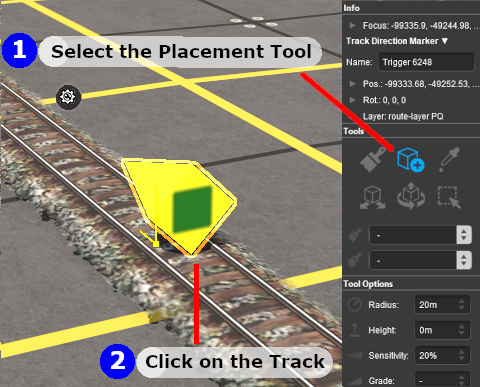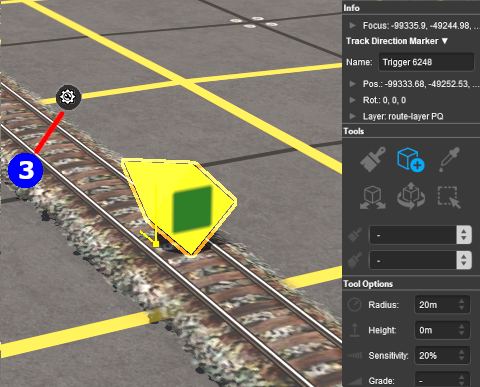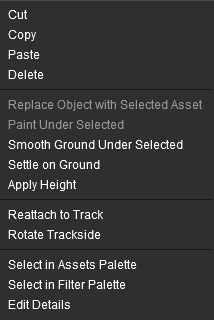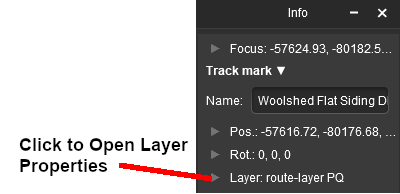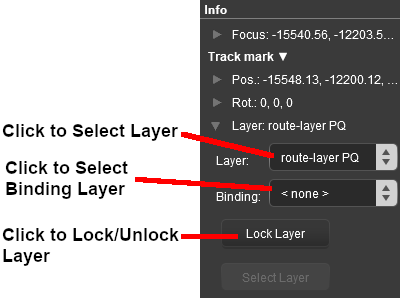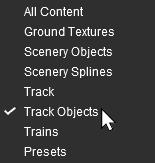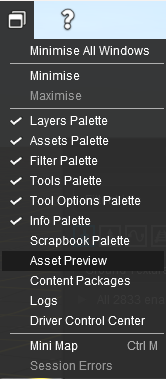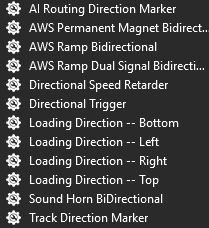|
|
| Line 639: |
Line 639: |
| | </tr> | | </tr> |
| | </table> | | </table> |
| − | </td> | + | <br> |
| | + | [[image:ContextMenuTrackObject_S20.png|link=]]</td> |
| | </tr> | | </tr> |
| | </table> | | </table> |
Revision as of 20:39, 27 July 2024
The information in this Wiki Page applies to TANE, TRS19, Trainz Plus and TRS22.
What are Track Direction Markers?
|
|
|
 |
|
 |
 |
While Track Marks can be used to direct trains around a layout, they must be added to the Driver Commands in the form of Drive Via commands, and similar, to individual train drivers to work.
Direction Markers can perform some of the same work without needing to be added to the command lists of the drivers. Their disadvantage is that Direction Markers will affect all AI controlled trains while Track Marks will only affect those AI trains where they appear in the driver command lists.
Direction Markers force AI drivers to follow a particular path. They only work on AI controlled trains and have no effect on manually controlled trains. |
|
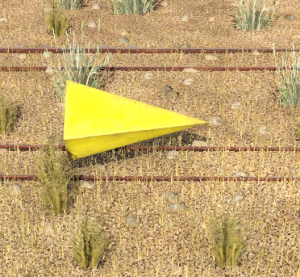 |
 |
Direction Markers can be placed in a Route Layer or in a Session Layer |
 |
Notes:
 |
Placing Direction Markers in a Route layer (e.g. in the same layer as the track) means that they will be available in all Sessions created using that particular Route.
|
 |
Placing Direction Markers in a Session layer means that they will only be available in that particular Session. This can be useful if two or more Sessions are being created and you want to use different Direction Markers in each Session.
|
|
|
 |
Information on Route and Session layers can be found at:-
|
Adding a Track Direction Marker
|
 |
|
 |
 |
 |
 |
 |
Notes:
The only important property of a Direction Marker is the direction it is pointing. This is the direction that all AI controlled trains will be forced to take.
|
|
In Surveyor Classic (S10)
|
 |
 |
|
|
|
|
Adding a Direction Marker (S10)
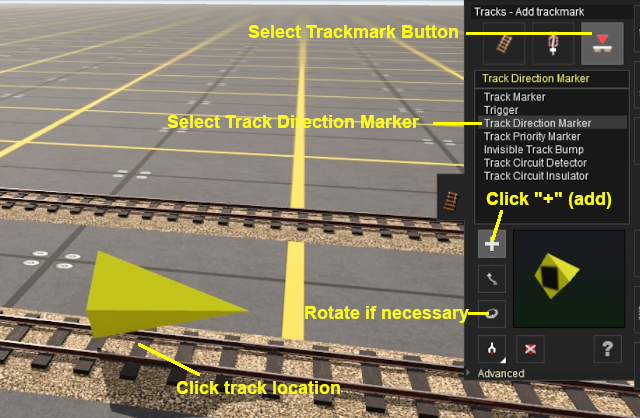 |
| Steps: To add a Track Direction Marker:- |
 |
Open the Track Tool flyout or press the F4 key |
 |
Left Click on the Trackmark button or press the V key |
 |
Left Click the item named Track Direction Marker in the asset list |
 |
Left Click the + Add button - it may already be selected - or press the A key |
 |
Left Click on the track location where the Track Mark is to be placed |
 |
if it is not facing the right direction then Left Click on the Rotate Trackmark button or press the R key |
| If necessary, you can adjust the position of the marker by dragging it along the track using the Move tool |
|
|
Set its Effect Radius (S10)
At the bottom of the Track Tools flyout menu is an Advanced button. Left Click this button to open the advanced tools.
The Effect Radius sets the size of green "effect wings" attached to both ends of the marker.
 |
Notes:
The Effect Radius has no effect on the operation of a Direction Marker but it allows you to keep its "visibility" clear of other track objects such as junctions and other markers. |
|
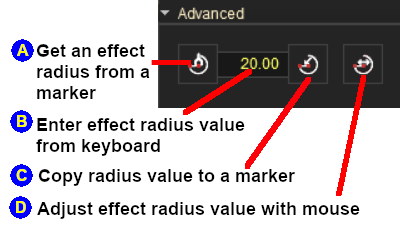 |
| Steps: To set a Direction Marker Effect Radius:- |
 |
In the Track Tools flyout, Left Click on the Advanced button to open the Radius tools and properties. You will have a choice of 4 methods to set and adjust the Effect Radius |
| Options: Choose one of:- |
 |
To copy the Effect Radius of an existing Direction Marker
 |
Left Click the Get Effect Radius icon |
 |
Left Click on the Direction Marker whose radius you want to copy - the radius will be copied into the Effect Radius Value text box (the default value is 20.00 metres) |
 |
To apply the new value see option  below below |
|
 |
To manually alter the Effect Radius value
 |
Type the new value (in metres) into the Effect Radius Value text box |
 |
To apply the new value see option  below below |
|
 |
To apply a value in the Effect Radius Value text box (from methods  , ,  or or  ) to another Direction Marker ) to another Direction Marker
 |
Left Click the Copy Radius Value icon |
 |
Left Click on the Direction Marker that is to receive the new value (you can click on more than one) |
|
 |
To adjust the Effect Radius value up or down
 |
Left Click the Adjust Effect Radius button |
 |
Select the Direction Marker |
 |
Left Click and Drag Forward (to increase the value) or Backward (to reduce the value) |
 |
The new value will be immediately applied to the selected Direction Marker as the mouse moves (but only one Direction Marker at a time) |
|
|
|
|
 |
Once you have an Effect Radius entered in the value box, you can apply it to any number of Direction Markers by using method  shown above shown above
|
|
In Surveyor 2.0 (S20)
|
 |
 |
|
|
|
|
Surveyor 2.0 is currently only available in Trainz Plus and TRS22 Platinum.
Adding a Direction Marker (S20)
 In the Filter Palette either:-
In the Filter Palette either:-
 Left Click on the Track Objects icon Left Click on the Track Objects icon
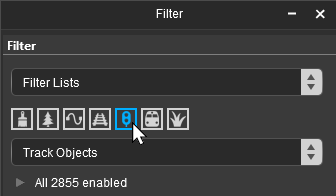
|
|
OR |
|
|
 Shortcut Shortcut
If you already have a Track Direction Marker placed in your route then:- |
 |
move the tool pointer over the existing direction marker object and hold down the Alt key. The object name will appear in a ToolTip attached to the pointer |
 |
while holding down the Alt key Left Click on the direction marker to identify it in the Assets Palette and to select the Placement Tool. Release the key. |
Jump to Step  below. below. |
|
 In the Assets Palette to narrow down the filter list, type "direction" (UPPER/lower case does not matter) in the Search Text Box
In the Assets Palette to narrow down the filter list, type "direction" (UPPER/lower case does not matter) in the Search Text Box
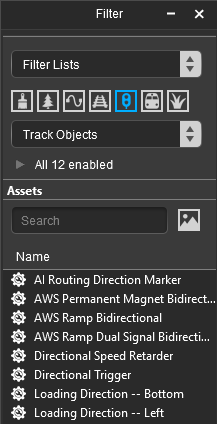
Both pallets shown docked |
|
 Place delected the Direction Marker on the track.
Place delected the Direction Marker on the track.
Set the Marker Direction (S20)
The direction that the marker points is its ONLY important property.
Change its Name (S20)
The name of the marker is only useful for finding it in the route. It is not needed for any operational purpose.
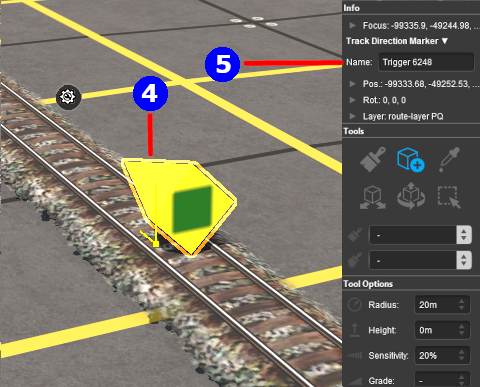 |
| Steps: To change the name of a Direction Marker:- |
 |
using either the Free Move Tool or the Fine Adjustment Tool select (Left Click on) the Direction Marker to be renamed |
 |
in the Info Palette (you may need to make this palette visible - see the Notes: for Step 1 above) Left Click in the Name: entry box. Enter a name for the Direction Marker and press the Enter key |
|
|
Set its Effect Radius (S20)
| The Effect Radius sets the size of green "effect wings" attached to both ends of the marker. It has no effect on its operation but allows you to keep its "visibility" clear of other track objects such as junctions and other markers. |
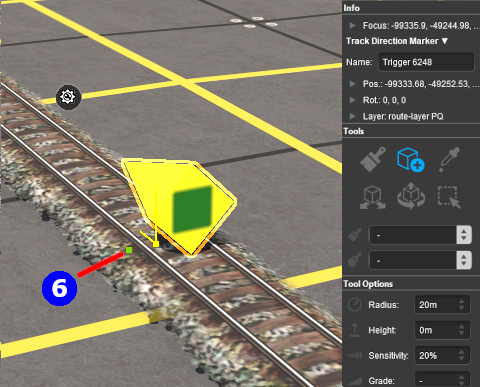 |
| Steps: To adjust the effect radius of a Direction Marker:- |
 |
Left Click and Drag Forward or Backward on the Green Dot next to the Track Mark to increase or reduce its Trigger Radius
 |
For the best results when adjusting the Effect Radius of any track object, move your camera POV (point of view) to directly above the object |
|
|
|
Move the Direction Marker Along the Track (S20)
Direction Markers can be moved along the track or to other tracks.
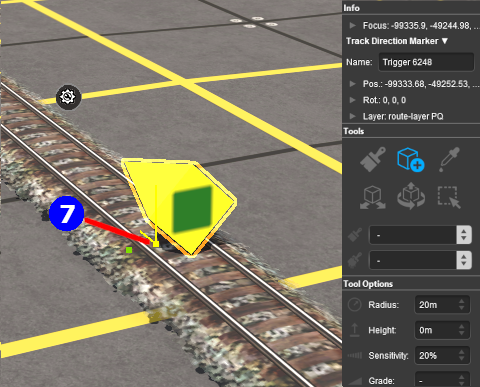 |
| Steps: To move the Direction Marker:- |
 |
Left Click and Drag Forward or Backward on the Yellow Dot next to the Direction Marker to move it along the track or to another track |
|
|
Move the Direction Marker Vertically (S20)
| Direction Markers can be physically placed above (or below) the track. This feature allows them to be placed, for example, above the track so that they will not be hidden in Surveyor if a consist is parked on a marker. |
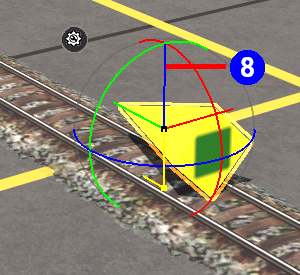 |
| Steps: To move a Direction Marker vertically:- |
 |
This option is only available with the Fine Adjustment Tool - the D key |
|
 |
Left Click and Drag Forward or Backward on the Blue Vertical Axis Line above the Direction Marker to it up or down |
 |
If you need to return the Direction Marker to its original position then:-
| Steps: To correctly reattach the Direction Marker to the track:- |
 |
select the object and open (Left Click on) its Context Menu Icon (or press the T key) |
 |
from the popup menu select Reattach to Track |
|
|
|
|
Move the Direction Marker Horizontally (S20)
| Direction Markers can be physically placed left or right alongside the track. This feature allows them to be placed, for example, beside the track so that they will not be hidden in Surveyor if a consist is parked on a marker. |
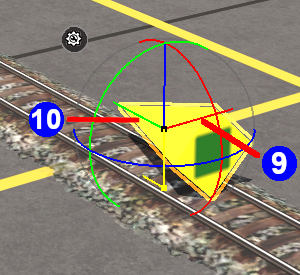 |
| Steps: To move a Direction Marker horizontally:- |
 |
This option is only available with the Fine Adjustment Tool - the D key |
|
 |
Left Click and Drag Forward or Backward on the Red Horizontal Axis Line attached to the Direction Marker to move it left or right |
 |
Left Click and Drag Forward or Backward on the Green Horizontal Axis Line attached to the Direction Marker to move it forward or back |
 |
If you need to return the Track Mark to its original position then:-
| Steps: To correctly reattach the Track Mark to the track:- |
 |
select the object and open (Left Click on) its Context Menu Icon (or press the T key) |
 |
from the popup menu select Reattach to Track |
|
|
|
|
 |
Notes:
The Green Horizontal Axis Line shown as  in the image pointing forward from the Track Mark will move it forward/backward regardless of whether it is on the track or not. It has the same effect as in the image pointing forward from the Track Mark will move it forward/backward regardless of whether it is on the track or not. It has the same effect as  Move a Direction Marker Along the Track. However, by using this tool it is possible to move the Track Mark beyond the end of the track if that is ever required. Move a Direction Marker Along the Track. However, by using this tool it is possible to move the Track Mark beyond the end of the track if that is ever required. |
|
Assign a Direction Marker to Another Layer (S20)
Direction Marker Operation
|
|
 |
 |
 |
|
 |
 |
Track Direction Markers only work on AI controlled trains. They have no effect on manually controlled trains |
 |
If the set path is blocked, then the AI will NOT attempt to find another path |
 |
A set path will be ignored if a shorter path is available |
| Consider the situation represented in the diagrams below. An AI controlled train is moving left to right towards a junction and a loop line. A Direction Marker (yellow triangle) has been set on the main line which only allows AI trains traveling right-to-left to pass along that section of track. |
| In Figure 1 below, The train approaches the junction at the start of the one way section. |

Figure 1
| In Figure 2 below, the train has been forced to take the loop line to avoid the section controlled by the Direction Markers. |

Figure 2
| In Figure 3 below, the loop line has been blocked by another train. The moving train will attempt to use the loop line but it will be halted and will not attempt to find another path. |

Figure 3
Direction Markers can be ignored by the AI
In Figure 4 below, the marker has been placed on the loop line and is pointing in the same direction as the moving train. However, the mainline path represents the shorter route for the consist so the "preferred" direction, as indicated by the Direction Markers, is ignored. Placing a Direction Marker is no guarantee that the path will be followed if more suitable paths are available. |

Figure 4
Trainz Wiki
|
|
|
 |
 |
|
|
 |
More Tutorials and Guides to Using Trainz
|
|
 |
Related Links
|
|
This page was created by Trainz user pware in September 2019 and was last updated as shown below.




In the Filter Palette either:-
In the Assets Palette to narrow down the filter list, type "direction" (UPPER/lower case does not matter) in the Search Text Box

Place delected the Direction Marker on the track.
